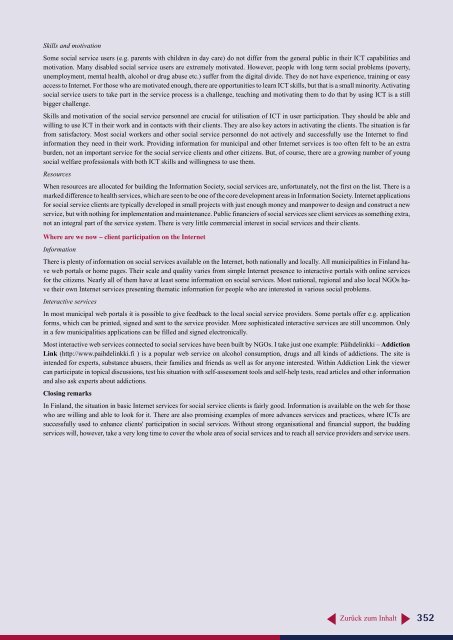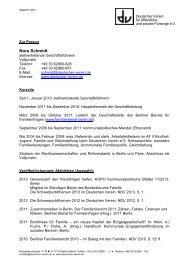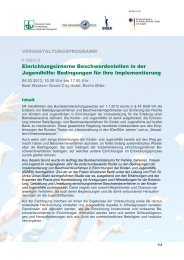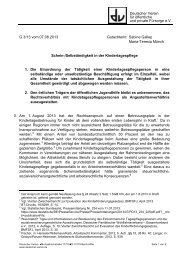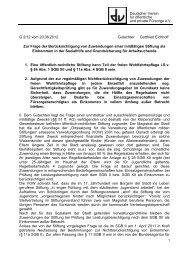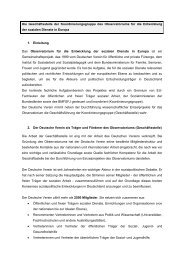Workshop 1.6 - Deutscher Verein für öffentliche und private Fürsorge
Workshop 1.6 - Deutscher Verein für öffentliche und private Fürsorge
Workshop 1.6 - Deutscher Verein für öffentliche und private Fürsorge
Sie wollen auch ein ePaper? Erhöhen Sie die Reichweite Ihrer Titel.
YUMPU macht aus Druck-PDFs automatisch weboptimierte ePaper, die Google liebt.
Skills and motivation<br />
Some social service users (e.g. parents with children in day care) do not differ from the general public in their ICT capabilities and<br />
motivation. Many disabled social service users are extremely motivated. However, people with long term social problems (poverty,<br />
unemployment, mental health, alcohol or drug abuse etc.) suffer from the digital divide. They do not have experience, training or easy<br />
access to Internet. For those who are motivated enough, there are opportunities to learn ICT skills, but that is a small minority. Activating<br />
social service users to take part in the service process is a challenge, teaching and motivating them to do that by using ICT is a still<br />
bigger challenge.<br />
Skills and motivation of the social service personnel are crucial for utilisation of ICT in user participation. They should be able and<br />
willing to use ICT in their work and in contacts with their clients. They are also key actors in activating the clients. The situation is far<br />
from satisfactory. Most social workers and other social service personnel do not actively and successfully use the Internet to find<br />
information they need in their work. Providing information for municipal and other Internet services is too often felt to be an extra<br />
burden, not an important service for the social service clients and other citizens. But, of course, there are a growing number of young<br />
social welfare professionals with both ICT skills and willingness to use them.<br />
Resources<br />
When resources are allocated for building the Information Society, social services are, unfortunately, not the first on the list. There is a<br />
marked difference to health services, which are seen to be one of the core development areas in Information Society. Internet applications<br />
for social service clients are typically developed in small projects with just enough money and manpower to design and construct a new<br />
service, but with nothing for implementation and maintenance. Public financiers of social services see client services as something extra,<br />
not an integral part of the service system. There is very little commercial interest in social services and their clients.<br />
Where are we now – client participation on the Internet<br />
Information<br />
There is plenty of information on social services available on the Internet, both nationally and locally. All municipalities in Finland have<br />
web portals or home pages. Their scale and quality varies from simple Internet presence to interactive portals with online services<br />
for the citizens. Nearly all of them have at least some information on social services. Most national, regional and also local NGOs have<br />
their own Internet services presenting thematic information for people who are interested in various social problems.<br />
Interactive services<br />
In most municipal web portals it is possible to give feedback to the local social service providers. Some portals offer e.g. application<br />
forms, which can be printed, signed and sent to the service provider. More sophisticated interactive services are still uncommon. Only<br />
in a few municipalities applications can be filled and signed electronically.<br />
Most interactive web services connected to social services have been built by NGOs. I take just one example: Päihdelinkki – Addiction<br />
Link (http://www.paihdelinkki.fi ) is a popular web service on alcohol consumption, drugs and all kinds of addictions. The site is<br />
intended for experts, substance abusers, their families and friends as well as for anyone interested. Within Addiction Link the viewer<br />
can participate in topical discussions, test his situation with self-assessment tools and self-help tests, read articles and other information<br />
and also ask experts about addictions.<br />
Closing remarks<br />
In Finland, the situation in basic Internet services for social service clients is fairly good. Information is available on the web for those<br />
who are willing and able to look for it. There are also promising examples of more advances services and practices, where ICTs are<br />
successfully used to enhance clients' participation in social services. Without strong organisational and financial support, the budding<br />
services will, however, take a very long time to cover the whole area of social services and to reach all service providers and service users.<br />
Zurück zum Inhalt<br />
352


